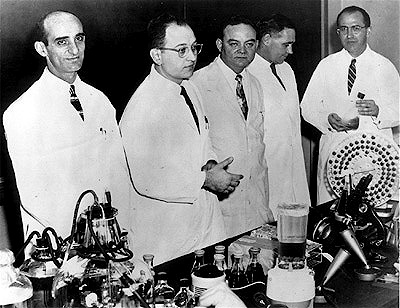Vaccine Protects Against Avian Flu Virus In Early Trial
University of Pittsburgh researchers announced
they have genetically engineered an avian flu vaccine from the critical
components of the deadly H5N1 virus that completely protected mice and chickens
from infection.

Jonas Salk, University of Pittsburgh in the 1950’s
University of Pittsburgh researchers announced they have genetically engineered an avian flu vaccine from the critical components of the deadly H5N1 virus that completely protected mice and chickens from infection. Avian flu has devastated bird populations in Southeast Asia and Europe and so far has killed more than 80 people.
Because this vaccine contains a live virus, it may be more immune-activating than avian flu vaccines prepared by traditional methods, say the researchers.
Furthermore, because it is grown in cells, it can be produced much more quickly than traditional vaccines, making it an extremely attractive candidate for preventing the spread of the virus in domestic livestock populations and, potentially, in humans, according to the study, published in the Feb 15 issue of the Journal of Virology and made available early online.
Dr. Gambotto and his colleagues suggest that rather than replacing traditional inactivated influenza vaccines, their adenovirus-based vaccine could be a critically important complement to them. Because it appears to be so successful in immunizing chickens against H5N1, widespread inoculation of susceptible poultry populations could provide a significant barrier to the spread of the virus via that route in this country and other countries that have so far been spared from avian flu.
“It takes a little over a month for us to develop a recombinant vector vaccine compared to a minimum of several months via traditional methods,” he explained. “This capacity will be particularly invaluable if the virus begins to mutate rapidly, a phenomenon that often limits the ability of traditional vaccines to contain outbreaks of mutant strains.” Dr. Gambotto added that his group is planning a small clinical trial of the vaccine in humans in the very near future.
Bravo!
Posted: Fri - January 27, 2006 at 07:16 AM